Twelve Ways To Control Cravings
How to Lose Weight and Get Healthier without Quitting the Foods You Love
As you know, if you read the articles on our site, we believe that a consistent and conscientious diet low in sugars and empty carbs is the most effective way to lose weight quickly. Of course, multiple weight loss strategies can be effective, depending on how you live your life, the things you enjoy, and your resolve.
Lack of Pleasure can Make Dieting Difficult.
Many people struggle with a diet that revolves purely around caloric restriction and consistently eating healthy one hundred percent of the time. Other people simply enjoy the foods they like in moderation.
Many people think that dieting means giving up the delicious, albeit unhealthy, foods we so often enjoy. This means no beer, french fries, cream sauces, candy, nothing fun ever.
candy, nothing fun ever.
The problem with a diet void of these sorts of guilty pleasures is that for many people, the lure of these foods becomes impossible to ignore, and an unhealthy obsession develops around intense cravings. Many dieters simply aren't capable of ignoring these cravings and give in and give up on their diet in shame.
Indulging Responsibly Can Make Dieting Easier
Many weight loss experts agree that it is possible to have a sensible diet while also making room to give in to these cravings in a responsible and manageable way. One professional, Dr. David Grotto, even suggests that avoiding guilty pleasure foods is a bad idea that can hurt more than it can help.
Dr. Grotto believes in a dietary plan known as structured cheating. This type of diet revolves around eating a healthy diet most of the time.
The most important aspect of maintaining healthy eating habits is keeping control of your diet and understanding your habits and how to limit their negative impact on your health. The key is to recognize that many foods you love are unhealthy and treat them with the necessary caution.
Maintaining Control is the Most Important Aspect of Dieting
You must control your diet, you can't let food control you, even if it means indulging yourself responsibly from time to time. Another doctor, Carolyn O'Neil, feels the same way. She believes that indulging responsibly is the key to a healthy diet and a healthy way of living.
She explains that anyone can engage in a problematic diet for a little while, but the problem with highly restrictive diets is that temptation eventually becomes too great, and all people but those with a strong constitution will likely fail and give in, splurging heavily on the foods that they've been avoiding and quickly reversing the gains they worked so hard to achieve.
The logical way to prevent this form of overindulgence is to recognize that to diet effectively, it may be necessary to cheat from time to time in a way that does not wreck your diet altogether.
The key to all of this is control and self-realization. You understand that your brain will drive you to certain foods, and you recognize that you can enjoy these foods safely without ruining your diet.
For example, if you love cookies, always pay attention to the number of calories in a serving and limit yourself in a sensible way. The more you understand about yourself and the foods you enjoy, the greater control you will have over your diet and the more success you will likely experience.
Twelve Ways to Manage Your Diet through Cheating: Know Your Food Weaknesses
Understand what foods tempt you and accept your desire. Especially in the early months of your new lifestyle, your cravings for the unhealthy foods you enjoy will only increase the longer you deny yourself the pleasure. By recognizing the foods that trigger you to potentially overeat, you can take steps to mitigate the risk that these foods pose to your diet.
Eat Filling Foods to Reduce Cravings
Eat foods that are filling. Another way to increase the success of your diet and reduce your desire for foods that will hinder you in the long run, is to eat foods that will fill your stomach while not contributing too heavily to your daily calories.
Fib and protein are the nutrients that achieve this goal most effectively, with the lowest contribution to your calorie count. Some examples of foods that
 can fill you up quickly are seafood, lean meats, salads, soups made from broth, vegetables, fruits, whole grains, and eggs. Even low-fat milk and dairy products can be good choices.
can fill you up quickly are seafood, lean meats, salads, soups made from broth, vegetables, fruits, whole grains, and eggs. Even low-fat milk and dairy products can be good choices.If you fill yourself up with these foods, you will limit your feelings of hunger and desire for foods that are more unhealthy for you. Another way to control your diet and cravings is to pack healthy snacks with you so you can quell your hunger with a low-calorie treat before it revs up into a full-blown craving.
Don't Settle for Junk When Indulging Yourself.
Instead of going for diet forms of the food, you love that can be just as unhealthy as the regular foods, choose foods that fulfill your cravings with big flavor rather than significant calories. For example, if salty foods are your favorite snacks, consider taking some kosher salt or sea salt and sprinkling it over a delicious and ripe tomato.
This way, you satisfy your desire for salt without turning to carbs or sugars and add a nutritious, low-calorie snack to your day. It will taste fantastic, and you'll quench your desire even more effectively than you would with a handful of peanuts or a pack of crackers.
Enjoy Your Meal with All Five Senses
Stimulate all your senses when you eat. This applies to healthy meals as well as dietary indulgences. You will eat healthier if you ensure that all of your senses are fulfilled in a meal, even sight. When you make a meal, garnish it colorfully and arrange it in a way that pleases your vision.
Also, eat the meal slowly so you can savor every bite's taste, smell, and sound. Take time to dwell on your meal, don't just gulp it down. Your brain desires satiation just as much as your stomach, and when you eat slowly and purposefully, you really let your brain in on the fun. Many people overeat because they simply don't take the time to enjoy their meals.
Plan Out Meals from the Very Beginning
Always plan your meals. For example, if you are the type of person that absolutely loves desserts, don't eat a complete and dense meal, then decide you can't leave the restaurant without dessert. Come to the restaurant knowing you will be getting dessert, and ask for a dessert menu before you order your entree.
Knowing that you will get dessert allows you to plan your caloric consumption around the entire meal, rather than giving in and tacking on more calories at the last minute. Planning your entire meal conscientiously will allow you to eat a healthier dinner to compensate for the splurge of the last course.
Eat What You Love, not Just What's Close.
If it doesn't fit your diet, eat only what you truly love. If you are going to cheat, don't just stick your hand in a bag of greasy potato chips; choose something that sates your craving in the best way possible.
Don't eat something unhealthy haphazardly just because you're hit with a craving; choose something that will truly make you appreciate your snack. For example, instead of buying a box of donuts to tempt you all week, go for a small piece of that pecan pie that you love and take the time to savor and appreciate it.
Make Your Own Treats
If you want it so bad, bake it yourself! If you want to splurge, take the time to make want you to want on your own time. This way, you can make it in the healthiest way possible and appreciate the work put into making the food you love so much.
If you like to eat blueberry muffins for breakfast each morning with your coffee, take the time during the weekend to cook up a week's worth of breakfast. Don't just throw in muffin mix; make it yourself with whole oats, fresh blueberries, and whole wheat. This way, you get a higher density of nutrients and fill yourself up more effectively.
If you love pizza, don't call the local pizza place and sit on the couch for an hour; learn how to make it yourself. Pizza is a food that is precisely as healthy or unhealthy as you make it. If you make it yourself, you can be sensible with toppings like cheese and tomato sauce and splurge on the foods
 that can make it a truly healthy meal, such as cherry tomatoes, spinach, grilled chicken, and artichokes.
that can make it a truly healthy meal, such as cherry tomatoes, spinach, grilled chicken, and artichokes.You can even make foods that sound indulgent to their core, such as cheesecake, and take steps to make them much more sensible. For example, you can add less sugar to your personal batch or substitute eggs and heavy cream for egg substitute and light cream cheese. You can even forgo the thick crust entirely for a modest base of cookie crumbs or broken-up graham crackers. You can also add low-calorie ingredients to your dessert, which add a real zing, including lemon zest.
Don't Eat Where You Work, Where You Rest, or Where You Cook.
Eat in specifically designated zones. How often do you find yourself zoned out at your office or on your living room couch, eating far more than you intended to mindlessly, just because it was there? You eat hundreds of calories, and thirty minutes later, you can barely even remember stuffing your face with cookies.
One big problem with how Americans eat is that most Americans don't give the food the respect it deserves. We are also so obsessed with maintaining productivity that we have a tendency to eat as an afterthought. By only eating in particular, designated zones, you force your brain to think about the foods you eat, whether you savor them or simply entertain the importance of a healthy diet.
In keeping with this theory, don't eat in the kitchen! Eating in the room where you keep all your food is just asking for trouble because nothing stops you from preparing seconds or moving straight on to the freezer to fix some fatty ice cream as a dessert.
Control Your Portions
Portion control is central to indulgence. You have to understand that you can eat the things you genuinely enjoy, even if they aren't healthy for you; you just have to eat them in small, sensible portions. If you eat smart, there is absolutely no food that should be considered off-limits to you so long as you remain cognizant of the importance of calorie control. Even dense foods like ice cream can be perfectly okay if you limit yourself to a small bowl and don't eat it too often.
You can also choose small portions which provide maximum flavor for the slightest bit. If you love chocolate, don't buy a milk chocolate candy bar daily; buy some exquisite dark chocolate and keep it in the freezer. When you have a craving, open the freezer and grab a couple of bites to consume slowly and deliberately to enjoy the escape responsibly.
Learn to Compromise with Your Cravings
Make compromises when necessary. If there are certain things that you absolutely love or can't live without, meet your cravings halfway to create a balance where your indulgence isn't exactly healthy, but it isn't game-breaking either.
Take sweet tea, for example. This staple Southern drink is packed with calories the way that it is popularly brewed and consumed. Rather than dump sugar into every glass of tea you drink, start cutting unsweet tea with sweet tea to satiate your craving while also limiting your calories.
Also, think about carrying an artificial sweetener with you, such as Stevia. Be very careful with these sweeteners, however, because most popular substitutes stimulate hunger, making dieting more difficult. Stevia is one of the few unique brands of artificial sweeteners which sate your desire for hunger without unwanted side effects.
In terms of food, think about ways to minimize the unhealthy portion of your meal while emphasizing the healthy part of your dinner. If you love pizza, make yourself a thin-crust pizza instead of ordering a hand-tossed pizza. This way, you can add healthy toppings to your pizza while not consuming too many unhealthy calories from thick bread crust. The compromise puts you in control of your vices in a powerful way that will go a long way toward helping you lose weight successfully.
Don't Change Your Whole Diet at Once
Make changes incrementally. Don't try to drastically change your diet over the course of a single day or week. Alter your diet a step or two at a time, getting your body acclimated to the changes you are making.
So much of eating doesn't have to do with hunger but habit. Your brain will start to rebel if you change too quickly, demanding that you go back to your
 old, reliable schedule, which just happened to involve overeating.
old, reliable schedule, which just happened to involve overeating.Also, implement small changes to your daily habits to encourage a more sensible diet and increased metabolism. If you occasionally indulge in a piece of chocolate cake, go for a walk around the neighborhood afterward. If you like to eat a burger for lunch twice a week, think about just buying the burger and cutting down the fries, or keep the french fries and only indulge once a week. There are a lot of little commitments that you can make, which will eventually add up to consistent weight loss gains.
Stick with Your Diet Even if You Slip
Don't give up just because you slipped up. It is nearly impossible to diet perfectly. Accept your infallibility and recognize that you will screw up from time to time and splurge irresponsibly. Simply take it on the chin and stay true to your long-term sensibility and weight loss goals.
So many people diet for a bit, then overindulge for one meal or one day, and think everything is ruined. Either that or they lose all composure and go back to overeating and eating unhealthy foods. Rather than give up, simply recognize your mistake and try to get some meaning out of it.
What made you back-step? What made you overeat? Understanding why you do what you do is incredibly important to a healthy and prosperous diet. By taking these conscientious steps, we are confident that you will find the inner composure to lose the weight and keep it off!
- 0001 Xylitol is a Natural, Plant-Sourced and Low-Calorie Sweetener [Last Updated On: January 8th, 2025] [Originally Added On: January 12th, 2021]
- 0002 The Secret Behind Keeping the Weight Off for Good -- No More Losing and Gaining Cycles! [Last Updated On: January 17th, 2025] [Originally Added On: January 13th, 2021]
- 0003 The Cognitive Benefits of Starting a CoQ10 (Coenzyme Q10) Supplement Regimen [Last Updated On: January 12th, 2025] [Originally Added On: January 14th, 2021]
- 0004 It's Time to Understand Why Vitamin C is Critical for Our Health and Longevity! [Last Updated On: January 10th, 2025] [Originally Added On: January 15th, 2021]
- 0005 Snoring is the Most Common Early Symptom of Sleep Apnea -- Do You Suffer From It? [Last Updated On: January 11th, 2025] [Originally Added On: January 16th, 2021]
- 0006 Vitamin-d Longevity Vitamin [Last Updated On: January 2nd, 2025] [Originally Added On: January 17th, 2021]
- 0007 Twenty Simple Weight Loss Tips That Can Change Your Life [Last Updated On: November 14th, 2025] [Originally Added On: January 18th, 2021]
- 0008 The Truth About The Zone Diet [Last Updated On: November 13th, 2025] [Originally Added On: January 20th, 2021]
- 0009 The Truth About The Schwarzbein Principle [Last Updated On: November 12th, 2025] [Originally Added On: January 21st, 2021]
- 0010 The Truth About The Realage Diet [Last Updated On: November 11th, 2025] [Originally Added On: January 22nd, 2021]
- 0011 The Truth About The Origin Diet [Last Updated On: November 10th, 2025] [Originally Added On: January 23rd, 2021]
- 0012 The Truth About The Eat Right, Live Longer Diet -- Nourishing Food Equals Increased Longevity [Last Updated On: January 31st, 2025] [Originally Added On: January 24th, 2021]
- 0013 The Essential Roles Magnesium Plays For Our Energy Levels, Skin Youthfulness and Mental Health [Last Updated On: January 4th, 2025] [Originally Added On: January 25th, 2021]
- 0014 The Real Skinny On Vitamin B12. What It Can And Cannot Do For You [Last Updated On: March 23rd, 2025] [Originally Added On: January 26th, 2021]
- 0015 The Importance And Purpose Of Stress [Last Updated On: February 18th, 2025] [Originally Added On: January 27th, 2021]
- 0016 The Ideal Balanced Diet The Reality Of Healthy Eating [Last Updated On: November 9th, 2025] [Originally Added On: January 28th, 2021]
- 0017 The Effects Of Cortisol On The Body [Last Updated On: April 27th, 2025] [Originally Added On: January 29th, 2021]
- 0018 Sixteen Common Foods That Increase The Cancer Risk [Last Updated On: November 8th, 2025] [Originally Added On: January 30th, 2021]
- 0019 Should You Consider Intermittent Fasting? [Last Updated On: October 19th, 2025] [Originally Added On: January 31st, 2021]
- 0020 Can Caloric Restriction Help You Lose Weight And Live Longer? [Last Updated On: October 18th, 2025] [Originally Added On: February 1st, 2021]
- 0021 How Does Poor Sleep Rob Vitality And Health? [Last Updated On: October 17th, 2025] [Originally Added On: February 2nd, 2021]
- 0022 Nine More Natural Ways To Relieve Anxiety [Last Updated On: October 16th, 2025] [Originally Added On: February 3rd, 2021]
- 0023 Metabolism Boosting Tips For Losing Weight And Feeling Great [Last Updated On: October 13th, 2025] [Originally Added On: February 4th, 2021]
- 0024 Juicing Pros And Cons [Last Updated On: March 22nd, 2025] [Originally Added On: February 5th, 2021]
- 0025 Insomnia Guide [Last Updated On: October 12th, 2025] [Originally Added On: February 6th, 2021]
- 0026 How To Lose Weight With Human Growth Hormone [Last Updated On: October 11th, 2025] [Originally Added On: February 7th, 2021]
- 0027 How Safe Is Monosodium Glutamate AKA Msg? [Last Updated On: October 14th, 2025] [Originally Added On: February 8th, 2021]
- 0028 How Is Sleep Apnea Diagnosed And Treated [Last Updated On: October 9th, 2025] [Originally Added On: February 9th, 2021]
- 0029 Hidden Sources Of Sugar In Common Foods [Last Updated On: October 8th, 2025] [Originally Added On: February 10th, 2021]
- 0030 How Would You Like to Potentially Add 14 Healthy and Youthful Years to Your Life Span? [Last Updated On: October 10th, 2025] [Originally Added On: February 11th, 2021]
- 0031 Four Reasons Why Healthy Sleep Encourages Weight Loss [Last Updated On: October 7th, 2025] [Originally Added On: February 12th, 2021]
- 0032 Omega-3 Fatty Acid Facts And How They Relate To Hormone Replacement Therapy [Last Updated On: April 24th, 2025] [Originally Added On: February 14th, 2021]
- 0033 Drink Right To Live Well [Last Updated On: October 6th, 2025] [Originally Added On: February 15th, 2021]
- 0034 Consumers Of Processed Meat Put Themselves At Risk [Last Updated On: October 5th, 2025] [Originally Added On: February 16th, 2021]
- 0035 Comparing The Same Mass Of Muscle And Fat [Last Updated On: February 19th, 2025] [Originally Added On: February 17th, 2021]
- 0036 Watermelon Health Food? The Benefits Of L-citrulline And Watermelon [Last Updated On: October 4th, 2025] [Originally Added On: February 18th, 2021]
- 0037 Alcohol Appears To Impact Sperm Quality [Last Updated On: October 3rd, 2025] [Originally Added On: February 19th, 2021]
- 0038 The Benefits of Selenium - Should You Take a Selenium Supplement? [Last Updated On: February 9th, 2025] [Originally Added On: April 8th, 2021]
- 0039 Selenium and its Impact on Your Health and Hormones [Last Updated On: March 3rd, 2025] [Originally Added On: April 8th, 2021]
- 0040 Scientifically Proven Benefits Of Turmeric The Indian Spice [Last Updated On: March 18th, 2025] [Originally Added On: April 27th, 2021]
- 0041 Natural Remedies for Heartburn or Acid Reflux [Last Updated On: February 18th, 2025] [Originally Added On: May 22nd, 2021]
- 0042 What the Heck Is a Raisin, Anyway and Why Would I Want to Eat One? [Last Updated On: May 18th, 2025] [Originally Added On: June 10th, 2021]
- 0043 Fat-Focused Diet May Help Boost Testosterone [Last Updated On: February 17th, 2025] [Originally Added On: June 10th, 2021]
- 0044 Chia Seeds: More Than Just a Fad [Last Updated On: April 11th, 2025] [Originally Added On: June 24th, 2021]
- 0045 Intermittent Fasting Boosts Growth Hormone, and Improves Cognitive Health [Last Updated On: March 4th, 2025] [Originally Added On: May 2nd, 2022]
- 0046 Growth Hormone, Nutrition, and Diet Affect Longevity [Last Updated On: February 14th, 2025] [Originally Added On: May 6th, 2022]
- 0047 How Your Health is Affected by Brown and White Fat [Last Updated On: February 14th, 2025] [Originally Added On: May 17th, 2022]
- 0048 Tesamorelin Boosts HGH Levels and Burns Belly Fat [Last Updated On: February 14th, 2025] [Originally Added On: May 21st, 2022]
- 0049 Build Muscle With Tofu - Don't Fear Soy [Last Updated On: November 7th, 2025] [Originally Added On: July 12th, 2022]
- 0050 Balancing HGH Levels with Weekly Sogroya [Last Updated On: November 5th, 2025] [Originally Added On: September 1st, 2022]
- 0051 Pecans Are Amazing [Last Updated On: February 19th, 2025] [Originally Added On: November 22nd, 2022]
- 0052 The Benefits of Fenugreek [Last Updated On: September 5th, 2025] [Originally Added On: November 24th, 2022]
- 0053 The Foods To Eat To Increase Stem Cells [Last Updated On: March 6th, 2025] [Originally Added On: December 7th, 2022]
- 0054 The Versatility of Pecans [Last Updated On: February 19th, 2025] [Originally Added On: February 9th, 2025]
- 0055 Understanding The Concept: A Pound Of Muscle Vs. A Pound Of Fat [Last Updated On: February 19th, 2025] [Originally Added On: February 11th, 2025]
- 0056 The Aging Enigma: Unravelling the Web of Human Growth Hormone Decline [Last Updated On: February 17th, 2025] [Originally Added On: February 12th, 2025]
- 0057 Rekindling the Flame: How a Fat-Friendly Diet Can Ignite Testosterone Levels [Last Updated On: February 14th, 2025] [Originally Added On: February 13th, 2025]
- 0058 Unlocking Your Inner Fountain of Youth: The Magic Elixir of HGH Injections for Women [Last Updated On: February 17th, 2025] [Originally Added On: February 14th, 2025]
- 0059 Effective Strategies for Controlling Cravings [Last Updated On: February 17th, 2025] [Originally Added On: February 17th, 2025]
- 0060 Overview of Hormone Replacement Therapy and the Role of Intermittent Fasting [Last Updated On: February 22nd, 2025] [Originally Added On: February 22nd, 2025]
- 0061 Understanding the Power of Stem Cells [Last Updated On: February 24th, 2025] [Originally Added On: February 24th, 2025]
- 0062 The Role of Selenium in Health and Hormones [Last Updated On: February 26th, 2025] [Originally Added On: February 26th, 2025]
Word Count: 2447






